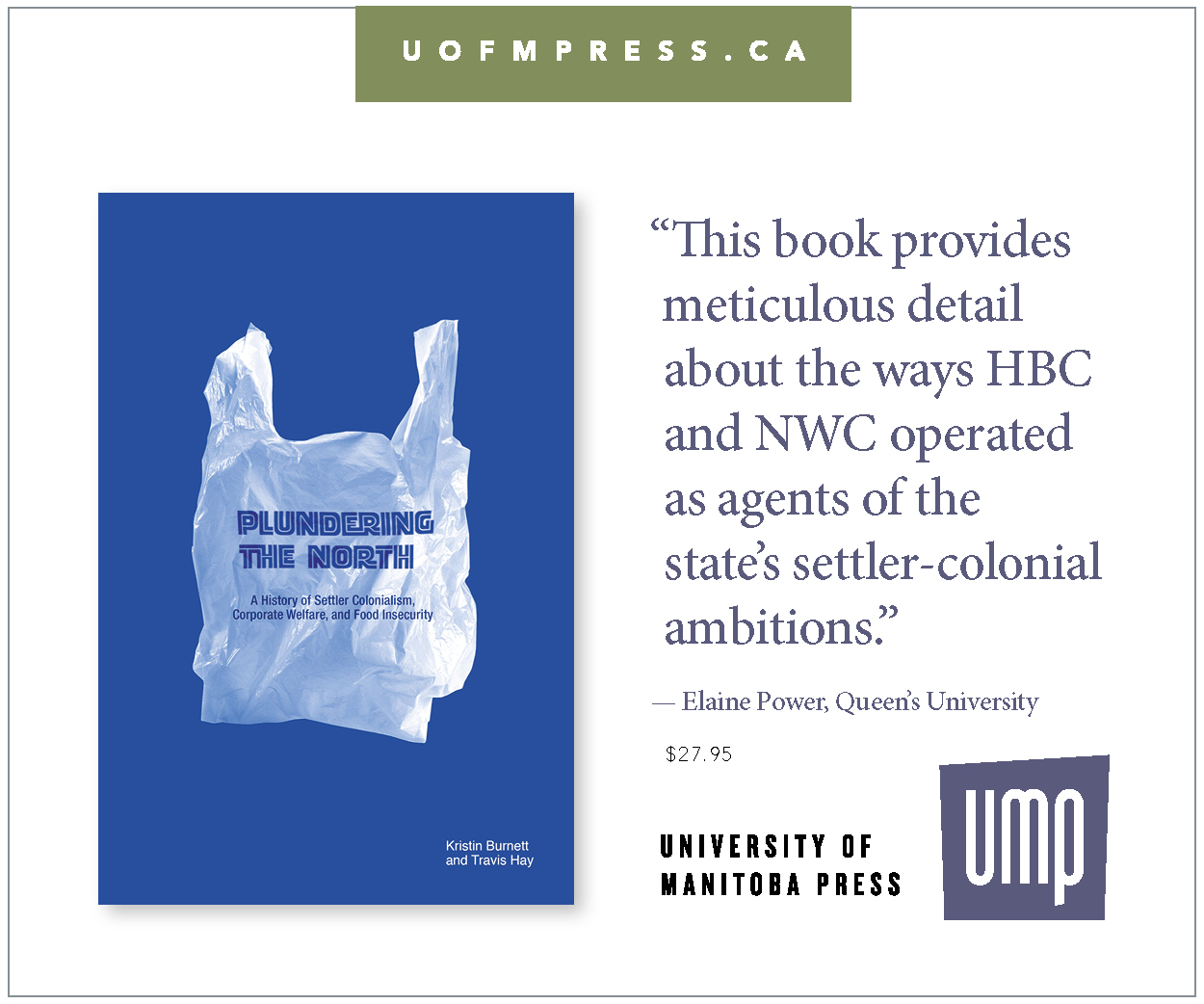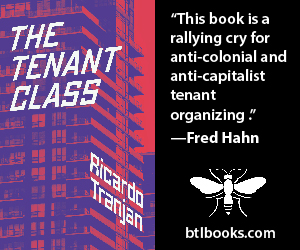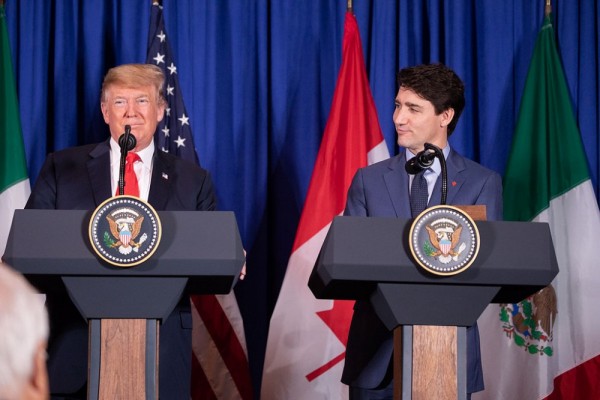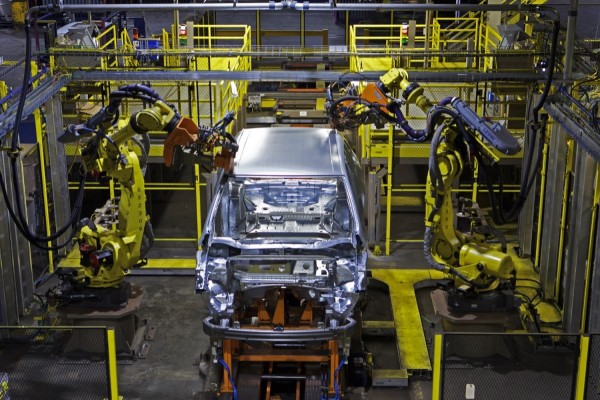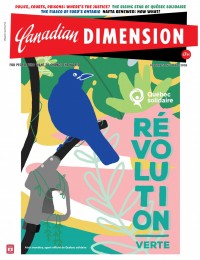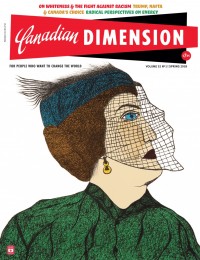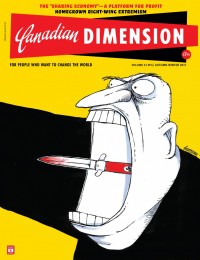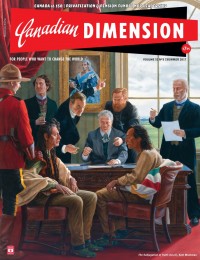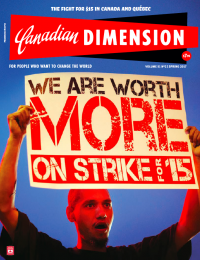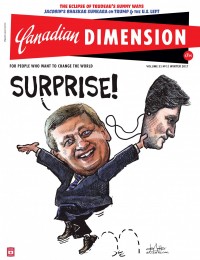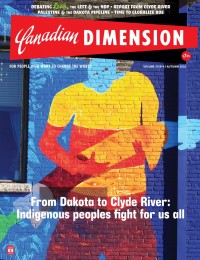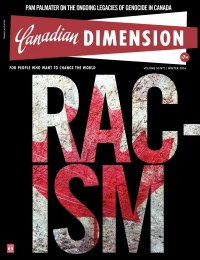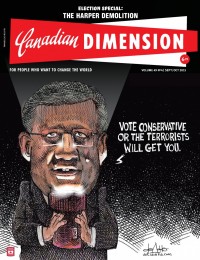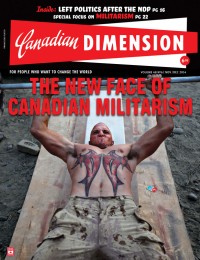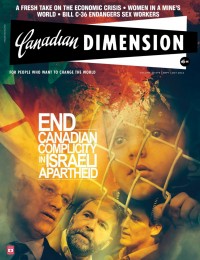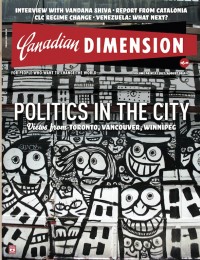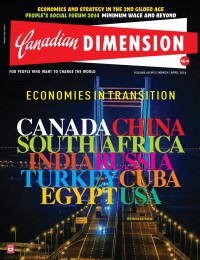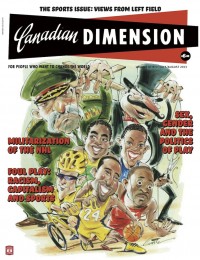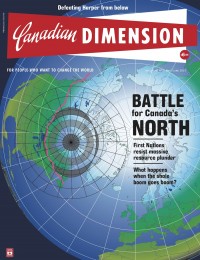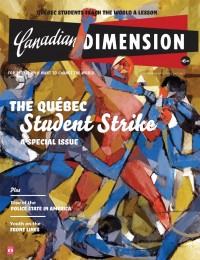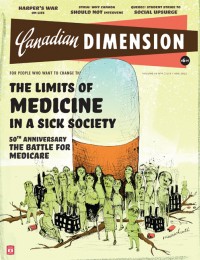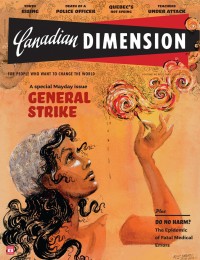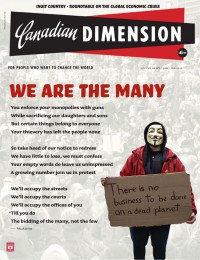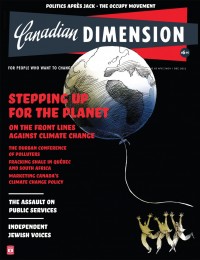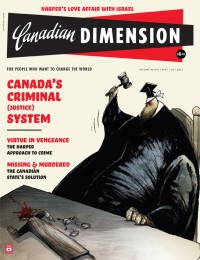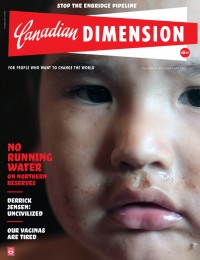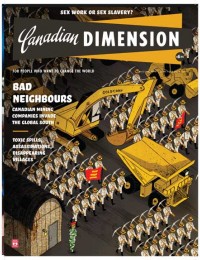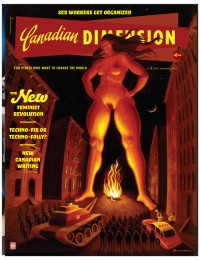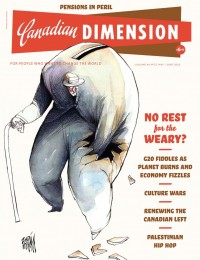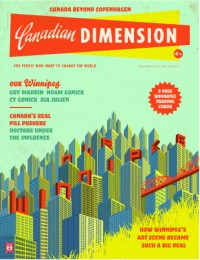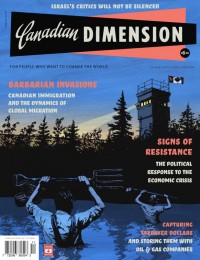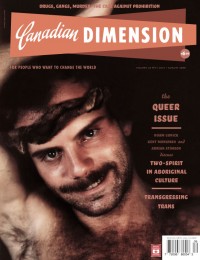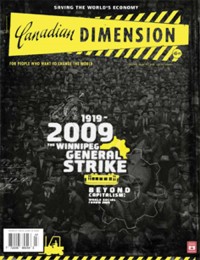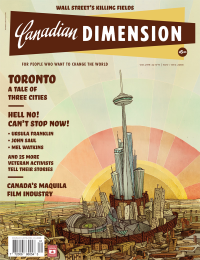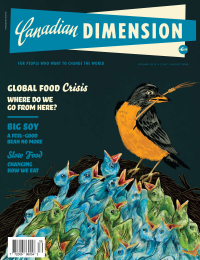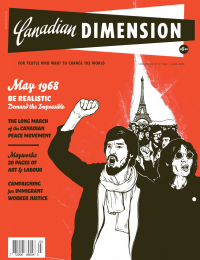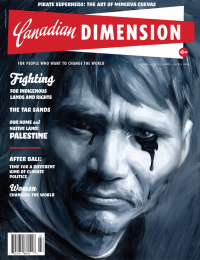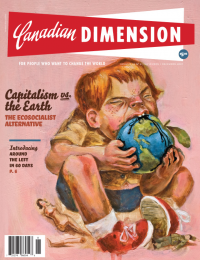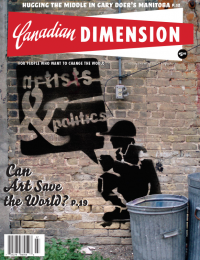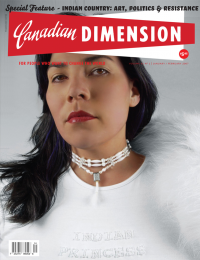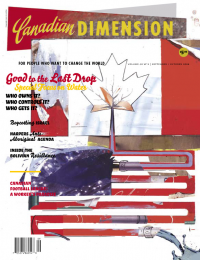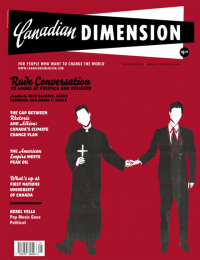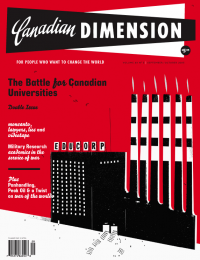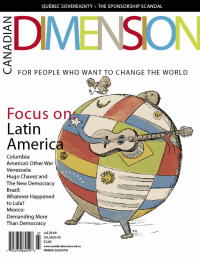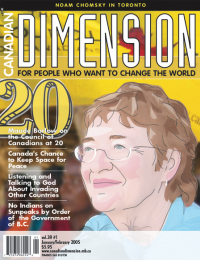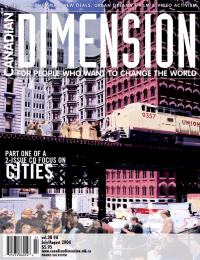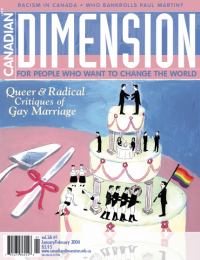The Council of Canadians at 20
An Interview with Maude Barlow

Maude Barlow, Honorary Chairperson of the Council of Canadians and chair of the board of Washington-based Food and Water Watch.
In March, 2005, the Council of Canadians will celebrate its twentieth anniversary. To mark the occasion, Canadian Dimension has chosen the Council as its Pathbreaker Towards a New Society.
Canadian Dimension: What comes to mind when you think back to the early days of the Council of Canadians in 1985?
Maude Barlow: I was fortunate enough to be involved from the very beginning. Mel Hurtig called me and said that I should come to a meeting in Toronto. I went and everyone I admired in the world was there: Bob White, Christine McCall, Stephen Clarkson, David Suzuki, just a wonderful group of people. My memory is of a frenetic round of meetings that ended in the launching of this new organization called the Council of Canadians. There was the excitement of knowing so clearly who we were and what we were about. Those were heady exciting tumultuous passionate early days.
CD: What do you see as the Council’s contribution to the last twenty years of political life?
MB: We’ve had some tremendous wins. We stopped a big pension grab, we stopped the bovine growth hormone and we stopped the bank mergers. I can point to being deeply part of both Seattle and Cancun, where twice we stopped the World Trade Organization. I look at wins like stopping genetically engineered wheat and the Multilateral Agreement on Investment. I think that we’ve helped keep health care in public hands. These are big powerful wins that we accomplished with others. We’ve certainly lost a lot – we haven’t stopped the neoliberal agenda. But I defy anybody to think about what Canada would look like without the Council of Canadians.
But sometimes you don’t go by what you stopped, but how well you helped to build a movement. The Council has grown and we have become a very stable part of Canadian life. We have also helped build an international movement around trade and water. I don’t look at winning and losing simply as the outcomes of particular campaigns, but rather as building a movement that’s sustainable and strong enough to take on the next task. I can’t tell you how many times people say to me that if it weren’t for us they would give up hope. So, I think a lot of our role is just providing that kind of hope through tough times. I often say that in speeches – just think how much farther this agenda would have gone without our resistance. We have to be proud of that.
CD: In 1984, Prime Minister Brian Mulroney said, “Give us 20 years and you will not recognize this country.” Do you recognize Canada today?
MB: It’s tremendously different, but it’s not as different as it would have been had they got everything they wanted. Conrad Black left Canada because this revolution wasn’t happening fast enough. But we’ve lost many of our social programs. We’ve lost family allowance. We’ve lost our unemployment insurance. Our pensions have been robbed. Canada has had the highest rise in child poverty in the industrialized world. There has been an assault on schools in Canada to make education conform to the global economy. Environmental responsibilities, particularly to fresh water, have been let go. These are very negative changes. At the same time, we have stopped many terrible things. Yes, the country has gone through its “cold shower of competition,” as Mulroney put it, but I think that our essential values didn’t change in the way he wanted them to. And there’s a deep and abiding resistance to this agenda in our country.
CD: What excites you about the Council today?
MB: I think that we’re still on the leading edge of the major issues in our country and in the world. We felt the need to set up something around factory farms. We can’t be talking about health, water and food and not be dealing with factory farming. I think we made a real difference during the Romanow Commission hearings. I spoke more than 65 times all over the country in a year and a half – again and again and again – giving the same message. We’re doing it again on the deep-integration issue. Now people are beginning to ask, what is this NAFTA-plus? What is this common market? We’ve been saying for a year and a half, now, they are up to something and it’s serious. Not since Mulroney gave his “open for business” speech in New York in 1984 has there been this kind of push to bring in the next level of deep integration. This one is really military. This is a military-security-energy pact zip-locking North America. It’s dangerous. I’m also really proud of the good work were doing internationally. We are a true presence around the world. We’re seen as leaders of the opposition against the WTO and of the Free Trade Area of the Americas. I’ve been to every single one of the WTO meetings, including Doha, Qatar. I’m very proud of the work we’ve done on water. Those in the South need to know there are people in the North who are friends and who care. Not in some kind, development-NGO-charity way, but as real colleagues, brothers and sisters in the struggle. I know I can learn more from the people I work with in countries like Uruguay and South Africa. We have some wonderful relationships internationally, and I think that we’re highly respected. I’m tremendously proud of that.
CD: With the fifth anniversary of the Battle in Seattle having just passed, what’s your take on the civil-society movement today?
MB: After September 11, there just isn’t tolerance for mass protest. That was the case in Miami for the last meeting of the FTAA. I was in Hawaii for an Asian Development Bank meeting two years ago, the police presence was the same. You couldn’t breathe without looking at a police club. They had us cordoned off and locked in. So, I think this is the reality that we are dealing with. This doesn’t mean that street protest doesn’t matter, but I think we’re recognizing that we also have to find new ways. They’re never going to give us another Seattle.
We are doing a great deal of work around alternatives. We all thought neoliberal globalization was failing the day it started, but now it has been proven to be a failure even to many people who supported it. So, the question now is: What have we got to offer in its place? And so, it’s very consciously that the Council has never put out a problem without presenting ways to address it.
Of course, there is also the creation of the World Social Forum. So, we no longer just go to where the corporate guys meet, but we find our own places to be together. Any city would welcome the World Social Forum now. It brings 100,000 to 150,000 people who come and eat in restaurants, stay in hotels, buy local products and take bus rides out into the community to meet people. Who would want the World Economic Forum or the WTO or the World Bank having a meeting in their city? You have to close down your restaurants, board up your streets, while they stay behind closed doors and eat their caviar. So, the funny part of it is that we’re generating economic benefits, if you will. Its not why we do it, but it always strikes me as a lovely corollary to it.
CD: In terms of deep integration, the C.D. Howe Institute has a series of papers on the subject, the Canadian Council of Chief Executives is lobbying for it and, now, former deputy prime minister John Manley is co-chairing an American-based Council on Foreign Relations task force on North American integration.
MB: This new committee on the future of North America is dangerous for several really important reasons. One is that John Manley is part of Canada’s ruling party, the heir apparent next time round. Moreover, Tom d’Aquino and Michael Wilson from big business are involved. They bring a shockingly one-sided perspective. Secondly, they are going to be reporting to the U.S. Council on Foreign Relations, not to the parliaments of the three countries, which tells us exactly who is running the show and what it’s all about.
They’re talking openly about a common market, common border standards, an energy pact and common enforcement standards and so on. I think it’s a very dangerous next level. It shows that the lobbying by the C.D. Howe Institute and the Canadian Council of Chief Executives has been very effective. On the other hand, it’s going to be very good for us, because right now we’ve got a bunch of smoking guns and no dead body. This is going to be the stinky dead body. We’re going to have something to work with now. The problem is there is too much evidence, and it’s all over the place, and we’re trying to put it together. What we need is a Free Trade Agreement or an MAI that we get in a brown paper bag and can show to people. We haven’t had that, yet.
CD: What is your assessment of Prime Minister Paul Martin?
MB: In my book, Straight Through the Heart, I wrote that there were two Paul Martins – that there was Paul Martin, the son of the social crusader. At least in his mind, his father was a social crusader. So, he grew up with a deep belief in giving back to his country and believing in social programs loved by his father. Then there was Paul Martin, the head of one of the biggest shipping corporations in the world that flags its ships offshore, that avoids Canadian taxes, and so on. I think that those two parts of Paul Martin have waged war within him. When he ran in the last election, he ran like an old fashioned Liberal, he took on Ralph Klein, he all but said that he isn’t George Bush.
My guess is that he would like to do something internationally, but the problem is his corporate model. His framework doesn’t allow him to see what really needs to be done. You can be for Kyoto, but you’re going to open up the tar sands and build a pipeline. You can be for everybody in the world to have water, but you’re going to support the World Bank’s privatization of the world’s water. You can be for everybody to have health care, but you pretend you never made those promises when you have a first ministers’meeting. So, there’s the elephant in the room, and Ralph Klein, Gordon Campbell and Jean Charest can go on privatizing to their hearts’ content.
I think he deals with his own conflicts by what a colleague of mine calls “the right not to know.” He just doesn’t want to know what his policies have done. After he dropped the bombshell of the 1995 budget cuts, which were devastating, it was to me like a fighter pilot that dropped the bomb and just flew off and had a nice dinner with his family with a clear conscience. He just wasn’t there when the bomb hit. He didn’t see the women’s shelters that got shut down, he didn’t see the environmental losses, and he didn’t see the park services that got cut.
I find him complicated. He’s not simple. I find John Manley more frightening. I find Manley so sure in his perspective. At least with Martin, I feel he’s struggling with these two parts of himself. His father is still in his head. I think he’s in an unpleasant position, now, having to keep the promises he made to us and face George Bush, who wants something else.
CD: That being said, how does an individual or an organization make social change happen?
MB: It was hard with Chrétien, too, because people didn’t have a visceral dislike of him. The problem we had then and that we have now with Martin is that they just don’t say what they are going to do. At least Mulroney said, give me this country for 20 years and you won’t recognize it. Chrétien was a little guy from Shawinigan. Same with Paul Martin: “I’m my father’s son, I pledge to protect medicare.” That makes it harder for groups like us to convince people that they really are doing the same thing. They are maybe a little slower, maybe now and then they sprinkle it with something good, like they didn’t go to Iraq – and I give Chrétien full credit for that.
I remember we interrupted the NAFTA signing in the Railway Committee Room. Mulroney screamed at us and we yelled back and were led out of the House of Commons on national television. My mother said, “Good for you. You were thrown out by that man.” With Paul Martin, she would say, “Why are you yelling at that nice man?” For us, by comparison, Mulroney and Reagan were a dream.
CD: The Council has been described in the media as nationalistic. Today, much of your work has an internationalistperspective. Has the Council changed?
MB: Yes, I’ve gone through a change, and so has the organization. Although, if you were to go back to our original declaration, we were very much talking about Canada and the world. In part, we wanted to keep social programs because we saw them as a beacon for the world and, if they were lost here, it would be tragic. And, of course, nationalism in Canada comes out at the left. It was there in the formation of the CCF and that whole movement out of the churches. So, in a way, we were receivers of that heritage.
However, we have fought very hard against being branded that narrowly and I think, to a large extent, it’s gone. I actually spent time a few years ago calling all the major outlets and asking them to stop putting nationalist before our name in news articles, because it’s not accurate of how we see ourselves or what we do. But it has truly been a transformation. We were fighting for Canadian social programs, Canadian culture, Canadian water and Canadian energy. Now I think we see it much more as sovereignties, democratic sovereignty, the right for sovereign people to make decisions for themselves, and how that’s part of the rights that the people around the world have.
CD: You’ve said, “If you want to know who is going to change this country, go home and look in the mirror.” What role do citizens have in a democracy?
MB: First of all, people should know that they have not only the right but the responsibility to be what some of us call intentional citizens. That is that, if you’ve been given the grace to live in a country like Canada, you just owe something back into making this country better. So, citizens should be activists.
Secondly, you can make a difference. People can feel overwhelmed, that there is nothing they can do. I hear this all the time. You tell them about the world water situation, the World Water Council and how they set themselves up as a global high command of water, the structure that has been built up globally to privatize the world’s water. Then people say that it’s so big that there’s nothing they can do. I say, of course there is – we’re actually winning, truly we are. You have to give people this sense of hope and it’s surprising how much a difference you can make.
And then, thirdly, I meet people who are activists. Of course, we would like them to come join the Council, but just join an organization that reflects your concerns, just get out there and be with like-minded people.
I say this to young people all the time. Being about something larger than yourself gives you a reason to live. It will take you through bad times, family problems, deaths of loved ones and terrible disappointments in life. Caring about something larger than yourself – having something you believe in that gets you up in the morning – that is not about making money and not about advancing your career, but about something else. It’s the best thing you can do for your mental health. It’s the best thing you can do for your physical health. Get out there and be part of something wonderful. Get out and fight for social justice! It will make your day.
The Council at a Glance
Current Campaigns:
- FAIR TRADE: A campaign to present alternatives to the free-trade models being promoted by the World Trade Organization and the Free Trade Area of the Americas.
- CLEAN WATER: An international campaign through the Council’s Blue Planet Project to have water recognized as a human right through a United Nations treaty, and a national campaign to prevent the bulk export of Canada’s water, stop the privatization of water systems and secure a new National Water Act.
- PUBLIC HEALTH: A campaign to stop the privatization of Canada’s public health-care system.
- SAFE FOOD: A campaign in partnership with the Beyond Factory Farming Coalition to win a moratorium on the expansion of intensive livestock operations.
- CANADA-U.S. RELATIONS: A campaign to raise public awareness and stop a new set of initiatives from groups like the Canadian Council of Chief Executives and the C.D. Howe Institute that seek to promote deeper political, economic and social integration between Canada and the United States.
Location:
- National Office in Ottawa; Regional Offices in Vancouver, Edmonton, Toronto and Halifax.
- Staff: 37, including campaigners, project officers and regional organizers, as well as communications and administrative staff.
Chapters:
- 72 chapters across the country (in every province, as well as in the Yukon and Nunavut).
- 32 in British Columbia (where the Council first started organizing Chapters), 19 in Ontario-Quebec, 11 in the Atlantic, 8 in the Prairies, 2 in the North.
Membership Profile:
- Currently approximately 100,000 members.
- Membership in 1986: 3,000; 1990: 18,000; 1996: 50,000; 2004: 100,000.
Budget:
- 94 per cent of the Council’s funding comes from its members, six per cent from foundations and zero per cent from corporations and government.
How to Join:
Telephone: 1-800-387-7177
E-mail: [email protected]
Visit: www.canadians.org
Views of Citizens and Business Elite on Canada-U.S. Relations Clash in Two Separate Forums
The Council of Canadians’ Crossing the Line: Citizens’ Inquiry on Canada-U.S. Relations has been planned for over a year, but it now has some competition that will be tapping into a constituency that has already made its opinion on Canada-U.S. relations abundantly clear: the North American business elite.
In October the U.S.-based Council on Foreign Relations (CFR) launched the Independent Task Force on the Future of North America, in partnership with the Mexican CFR and the Canadian Council of Chief Executives (CCCE).
According to the CFR’s press release, the task force “will review five spheres of policy in which greater cooperation may be needed. They are: deepening economic integration; reducing the development gap; harmonizing regulatory policy; enhancing security; and devising better institutions to manage conflicts that inevitably arise from integration and exploit opportunities for collaboration.” The first meeting of this group was held in Toronto, in October, and the second one in New York, in December. A third meeting is scheduled in Monterrey, Mexico, early in 2005.
The Canadian Chair of this “task force” is former industry minister John Manley, who had already expressed his support for deeper economic integration with the U.S. in March, 2000. His vice-chair is none other than Thomas D’Aquino, president and chief executive of the CCCE. Other Canadians on the task force are also integration supporters, including Wendy K. Dobson (Rotman School of Management, University of Toronto, and C.D. Howe Institute), Thomas Axworthy (Queen’s University), Michael H. Wilson (former Conservative finance minister, now with UBS Global Asset Management Co.) and Pierre-Marc Johnson (former Quebec premier, now with law firm Heenan Blaikie).
The outcome of this exercise has already been determined: The task force is not to study if deeper integration is desirable, but how to achieve it. It shouldn’t be too surprising that the CFR is behind this initiative, since its president, Richard H. Haass, sees integration as a doctrine for the U.S. He expressed this view, more notably in his previous function as director of policy planning staff at the U.S. State Department, where, in an April, 2002 speech, he declared that, “In the twenty-first century, the principal aim of American foreign policy is to integrate other countries and organizations into arrangements that will sustain a world consistent with U.S. interests and values, and thereby promote peace, prosperity, and justice as widely as possible.”
Unlike this task force, the Citizens’ Inquiry on Canada-U.S. Relations takes its cue from citizens, and challenges the assumption that deeper economic integration is a worthy goal to achieve. Prior to the holidays, the Council held thematic public hearings in Winnipeg (agriculture), Saskatoon (health care), Calgary (energy), Victoria (missile defence) and Kelowna (Aboriginal perspectives). Its schedule for winter, 2005, includes hearings in Windsor (border issues, Montreal (immigration and refugees), Saint John (defence and security), St. John’s (water, natural resources and environment) and Ottawa (media and culture). It is also considering holding one or two additional hearings, in Whitehorse and Yellowknife, on northern issues.
A report will then be drafted and presented to the various Canadian government levels to ensure that the process and the consequences of deeper economic integration to the U.S. will be better understood than they currently are. The report should be ready by late March, 2005.
Guy Caron is the Campaigner on Canada-U.S. Relations for the Council of Canadians. The Council has undertaken a Citizens’ Inquiry on Canada-U.S. Relations, a series of ten public hearings across the country to gauge Canadians’ real attitudes toward the various issues related to Canada-U.S. Relations. For more information, please visit www.canadians.org.
This article appeared in the January/February 2005 issue of Canadian Dimension .

.png)
